The Philosophy of Human Design – Restoration Hardware Toronto
Anchoring the brand-new wing of Yorkdale is the grandiose, luxurious furniture retailer Restoration Hardware Toronto. Dolce had the pleasure of chatting with founder Gary Friedman to discuss RH’s experiential nature, his values and beliefs, and what makes him such an incredible curator.
interview by sarah kanbar
From the outside, RH Toronto is a luxurious concoction of a hotel, a movie set from a dream. All three floors of this magnificent structure are adorned with large windows that allow anyone outside a view into this riveting world. A massive skylight highlights the main entrance with its “RH” logo, as if to say, “Let there be light.” The transparency of RH Toronto beckons your entry; it invites you in to see what it’s like on the other side, where the light is brighter.
If the outside is a cocktail of hotel, a movie set and a dream, then the inside is the same but with a rousing sense of hospitality and warmth added to the mix; RH Toronto blurs the line of home and hominess, the unorthodox enterprise is simultaneously retail and residential. RH Toronto is meant to “activate all of your senses — sight, sound, taste, touch [and smell],” says RH chairman and CEO Gary Friedman. Every aspect of RH Toronto is created with the senses in mind.
“A sense of harmony” is the feeling RH Toronto provides as you walk through the doors, says Friedman. RH’s design philosophy is based on a reflection of human design. Its “balance-based symmetrical proportions [are] based on the golden mean,” Friedman says, referring to Aristotle’s theory of scale-based proportional values. Every aspect of RH is designed to be human-based. “I want people to feel a sense of harmony, to walk into the space and go, ‘ah, that feels good.’”
Partnered with long-time collaborator, architect James Gillam, RH Toronto aims for a neutral vibe and environment. Friedman compares the symmetry to human design — a tenet of the Backen, Gillam & Kroeger Architects design philosophy. “We are all some shade of a neutral. Nobody is green, nobody is yellow [and] nobody is red,” Friedman points out. RH instills this idea of neutrality into its design and integration; it is “all kinds of degrees of shape, and proportions and sensibilities that are a reflection of human design,” says Friedman.
Instead of being designers, RH Toronto is more of a curator. Gathering inspiration from all over the planet, and finding the best artisans and designers to work with, Friedman and RH’s specialty is integrating all of these components into the RH mindset. “We really try to curate the best people, the best products, the best ideas, the best inspiration, and then, the thing that we probably do best is integrate those people, products, ideas and inspiration into kind of an integrated point of view that reflects our own personal taste and style,” Friedman clarifies.
The integration of the best of everything is how Friedman relates RH to Apple. In the same way that Apple obtains all of the best developers and designers to develop and design “for the best platform,” RH searches for and locates the best artisans, designers and people to create for it. “We’re trying to build the best design platform [so] that the very best designers, artisans [and] manufacturers in the world want to design for our platform, because our platform can amplify their work,” Friedman says.
Friedman and RH are always on the lookout for what is new and great, a process that is an integral part of the company’s platform. “If somebody shows me a great table, the first thing I usually ask is, ‘who did that?’ If you find the right people, they usually have other great ideas,” Friedman says. Being able to take and put together ideas from all over the world and combine them with harmonious synergy is nothing short of impressive. But impressiveness is what Friedman specializes in.
Considering his rigorous eye for talent and detail, you might not have expected that Friedman grew up not having much of anything. “I grew up with a single mom. My dad died when I was five. We never lived in a house. We never had any furniture. The most money my mom made in a single year, her best year ever, was $5,000. So we grew up on welfare, food stamps [and] got evicted from apartments. I always think maybe I’m not good enough and I’ll get fired tomorrow, so you’ve got to get better and work harder.”
Friedman’s desire to evolve and constantly improve is evident in what RH is. RH is not just a store that you walk into; it is a living, breathing space that is constantly growing and adapting, both to its environment and to what is new and current. It is this mentality of “never being finished” that keeps Friedman at the top of the designer game — that combined with being a perfectionist.
The ability to notice minute details is a “gift and a curse,” Friedman says. “I’ve never done anything or experienced anything in my life where I didn’t immediately [think] it could be better. But once you look at it again and again from different angles and different perspectives, you realize that everything can always be better.” Even during our interview, Friedman notices little details about the space around him that could be improved. But his keen eye makes him aware not only of what looks good, but also what would look great.
That’s not all that makes RH work; there’s also the idea of what RH itself should be. Blurring the lines of home and hospitality is crucial for Friedman. People can go years without stepping into a home furnishings store. After seeing the success of the first RH Café in Chicago, Friedman halted construction on RH Toronto in order to figure out how to integrate a restaurant. Adding a food venue enhances RH Toronto overall. When people come for food, they can explore the furnishings and everything else the rest of the store has to offer. Friedman elaborates, “We like to say we don’t really build stores. We try to create inspiring spaces that blur the line between residential and retail, that create a space of more home than store.”
The blurring of home and store is extremely evident as soon as you walk into RH. Most furniture stores are quiet, lifeless places with an employee wearing a pronounced smile and offering you “the deal of a lifetime.” RH does not feel like a furniture store at all, but an intriguing crossbreed of lively Parisian café and a neutral-toned, sitting-encouraged art gallery. It is by far the most comfortable you will ever be while having a coffee.
Part of Friedman’s intention in making RH hospitable is the belief that humans are intrinsically social creatures. “It’s why we like to go out to restaurants to eat, or why we go out to movie theatres when we could watch a movie at home; we could cook food at home, but we generally like to be around other humans,” says Friedman. RH feels like a social space made for congregating and conversing. The open floor-plan and the feeling of freedom to browse at your leisure encourages people to meet, explore and wander together.
The experience of RH Toronto is one that entices people to come out, rather than shop online. When people see RH Toronto firsthand, they can immediately tell the difference. The size, depth and design make it easily stand out, even in the extremely busy Yorkdale Shopping Centre. “The Internet is the most democratic channel, if you think about it. It’s the hardest to distinguish yourself. Holly’s home store can look as big as RH online. The screen is the same size; the only way to know we’re different is to click on that screen 10,000 times and see we have such an assortment,” says Friedman. Besides the fact that RH hosts some of the world’s finest crafted furnishings, it distinguishes itself because of what it offers as a whole. Grandiose presence aside, the environment and the capabilities of RH Toronto set it apart not just from other home furnishings stores, but from all other retailers.
“We’re big believers in creating physical spaces that aggregate people, activate all the senses [and] make people feel good,” Friedman says. Other retail stores do not offer anything close to that feeling. Friedman gives a few examples, such as “windowless department stores,” the “lack of humanity” and “lack of imagination” in retail. “Most retail stores are archaic, windowless boxes that lack any sense of humanity. There’s no fresh air, there’s no natural light. Plants die in a department store.”
Friedman has made sure that RH Toronto is nothing like that. Thanks to 120 French doors and windows, there is all kinds of natural light, enhanced by the massive skylight across the front of the building. All three sides of the building face natural light and fresh air, and the windows can be opened. This is all accentuated by the chance to taste food, touch the furniture and view dramatic installations — “an experience that would be difficult to recreate online,” says Friedman. “I think that physical world experiences [are] why we go on vacation. Otherwise we would just go online and look at everything. You kind of want to go there, and go see that, and experience that. That’s fundamentally what we believe in. These galleries are really authentic expressions of what we believe.”
These beliefs are evident in the careful craftsmanship of every meticulous detail of the store. Decorated with mirrors, art, chandeliers and, of course, furniture, RH Toronto presents itself as more than just a store. It is the embodiment of the values that Friedman and RH hold.
“Everything you see here is a reflection of our values, beliefs, our taste and our style,” Friedman says. The RH culture is engineered all around its values and belief system, and is omnipresent in the company. These values and beliefs distinguish RH from other retailers.
“It’s about who has the best idea and what’s the best idea, and how do you focus on what’s right rather than who’s right” — Gary Friedman
RH’s values are “people, quality, service and innovation,” says Friedman. He puts emphasis on finding the right people, creating the best items and standing out. “We’re very specific about the kind of people that we believe are the right people. We’re very specific about how we think about quality, how we think about service and how we think about innovation being at the core of what we do.”
The same focus is put on RH’s beliefs. “These tenets form the “The RH rules”: “Vision is everything, love us or leave us, [and] this is personal,” “there is no school for cool, and fast is as slow as we go,” Friedman coolly states.
Following these values and beliefs is not always easy, though. In a big corporation especially, these finer details can get lost between the cushions as problems arise — an issue that RH was unable to avoid and that Friedman himself had to rectify.
Discussing the infamous memo he wrote to his employees, Friedman clarifies, “I wasn’t yelling at anybody; I capitalized the most important points.” Friedman sent the memo out to his employees last year after the store RH Modern was launched and quickly found itself six months late in orders. “That specific note was to empower everyone, was to let people know, no one will ever get in trouble for making the customers happy, but you might lose your job if you don’t. We’re a service business. Don’t worry about making any decision, no matter how costly, to delight a customer,” Friedman says.
Friedman did this to reinforce the values and beliefs that RH abides by. For him, they are not just circumstantial happenstances to promote a healthy business image, but an integral part of RH’s identity. Friedman uses the analogy: “Everybody was talking about … the burning building. ‘Who started the fire?’ ‘How did it start?’ ‘What are we going to do?’ How are we going to put it out?’ Nobody was talking about the people in the building…. The fire department doesn’t go and put out the fire in the building while there’s people in the building. The fire department goes and gets people out of the building. They save the people.” It is this kind of dedication to the customer over everything that separates Friedman and RH from other companies.
Friedman stresses constant communication, and even has a chief values officer. “The leaders in our organization have to live our values. We believe the organization is a reflection of our actions and behaviour,” Friedman says. Not only the leaders have to live these values, which Friedman himself wrote; RH also ensures that its team is comprised of people who similarly are concerned with what’s right over who’s right, in terms of both morals and product.
In a profession with new and different challenges every day, Friedman requires people who will not have their egos bruised or get in the way of a better idea. “Forget about what I liked yesterday. Maybe I had an idea that was really good yesterday, but somebody has a better idea today. It’s not about whose idea it was. It’s about who has the best idea and what’s the best idea, and how do you focus on what’s right rather than who’s right,” Friedman says.
The never-ending search for what is right harkens back to the philosophy of human design, and Friedman’s constant striving for the golden mean. RH is never finished trying to reach the ultimate balance between better and best on the scales of quality, service and moral fibre.
With so many RH locations, Friedman is motivated by his passion. “I love to learn. I love to be open…. I’m just excited to learn and grow. The more I learn and grow, the better leader I am,” Friedman says. Friedman sets the tone for the company and ensures that everyone follows his lead.
One thing that Friedman avoids is being judgmental. “People being judgmental is why we have conflicts in this world, why we have wars in this world [and] why we have divisiveness in this world.… When you’re judgmental it’s like closing the window shade; you don’t let the light in. If you don’t let the light in, you can’t see. If you can’t see, you can’t learn.” Friedman avoids this, not only because of his socio-political standpoints, but also being open to fresh ideas and concepts allow him to learn and grow.
Qualities that Friedman highlights are being curious and critical. “New information, new data [and] new perspectives come in all the time, and you can see something you couldn’t have seen a moment ago or a day ago. You can usually make it better,” he says. Even in RH Toronto itself, Friedman can see aspects that he would like to change. “We like to say we’re always unfinished, always on the move. We’re never really finished with anything. We’re kind of always learning and growing,” Friedman says.
The RH brand stands out as an example of hard work and dedication. The blood, sweat, tears and materials that are put into every single one of RH’s products and stores are a testament to that. For other brands out there, Friedman recommends being authentic and following your heart.
“I think what people appreciate is honesty and authenticity. Not someone who’s trying to make it, or it’s not really what they believe in, and it seems overly scripted or something,” says Friedman. “We try to operate from a really deep level of authenticity, what we truly believe in, what’s really meaningful to us, and we obsess about those things,” Friedman says.
This authenticity fuels what RH is and bleeds right into the heart of the company. “We like to say [that] by chasing our hopes and dreams, we inspire others to chase theirs, and by fearlessly fighting for what we believe in, we encourage others to do the same,” Friedman says.
But no matter what one is doing, Friedman’s advice is to keep pushing and working toward it. “Fight for what you believe in and chase your hopes and dreams. If you get knocked down 10 times, get up 11 and keep going. Usually, we as humans will do that when we deeply believe in it…. The work we do, our best work — sometimes we get knocked down 25 times, and [we] have to get up 26. It’s hard to do. You have to really believe in it. You have to really be passionate about it. We see the history of humanity; men and women will work for a dollar, but die for what they believe in. That’s what I say to anything, be it a brand or whatever: just have your own voice, do your own thing [and] make sure you believe in it. It doesn’t really matter if someone else is doing it too; if you believe in it more deeply, you might do it better than them. Originality comes from our own unique perspective.”
RH’s unique perspective comes from Friedman, and the people he collaborates with. The constant balancing of the scales to achieve the golden mean is the core of Friedman’s originality and unique perspective, which is what makes RH and RH Toronto a beacon — not only of design and innovation, but also of authenticity, heart and, most of all, human design.
PHOTOS COURTESY OF RESTORATION HARDWARE











































































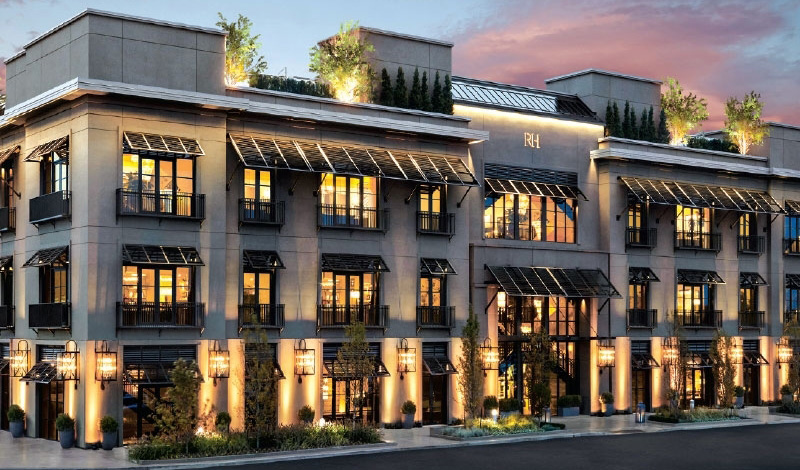










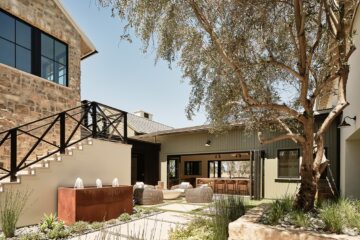
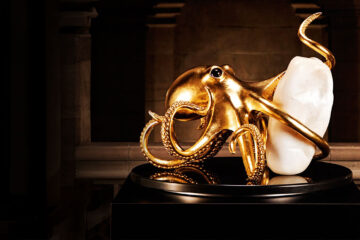
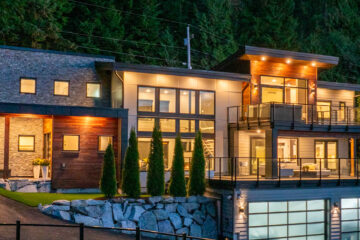
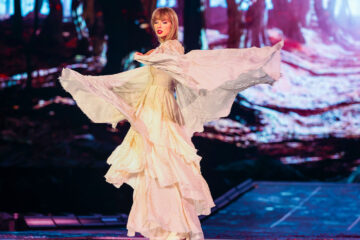

No Comment